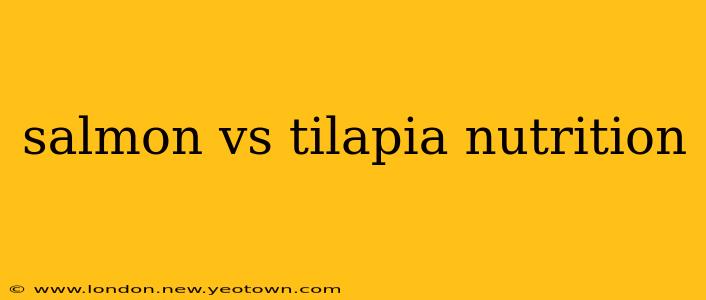Salmon vs. Tilapia: A Nutritional Showdown
Choosing between salmon and tilapia at the grocery store can feel like a culinary dilemma, but understanding their nutritional differences can make the decision much easier. Both are popular, readily available fish, but they pack quite a different punch when it comes to vitamins, minerals, and overall health benefits. Let's dive into a head-to-head comparison, exploring the nutritional battlefield between these two aquatic contenders.
Imagine this: you're at the fish counter, eyeing a glistening salmon fillet next to a stack of firm tilapia. Which one will nourish your body best? The answer isn't always straightforward, as the "best" fish depends on your individual nutritional needs and preferences. However, comparing their nutritional profiles provides valuable insights into their distinct health advantages.
Salmon: The Omega-3 Powerhouse
Salmon, particularly wild-caught varieties, reigns supreme in the omega-3 fatty acid department. These healthy fats are crucial for brain health, heart health, and reducing inflammation throughout the body. Think of them as tiny superheroes fighting off cellular damage and keeping your systems running smoothly. Beyond omega-3s, salmon is a fantastic source of protein, vitamin D (essential for bone health and immune function), and vitamin B12 (vital for nerve function and red blood cell formation). It also boasts a good amount of potassium, which helps regulate blood pressure.
The rich orange hue of salmon speaks volumes about its high levels of astaxanthin, a powerful antioxidant that combats cellular damage caused by free radicals. This antioxidant action contributes to its anti-inflammatory properties, making it a star player in preventing chronic diseases.
Tilapia: The Lean and Affordable Option
Tilapia, on the other hand, presents a leaner, more affordable alternative. It's a good source of protein, relatively low in fat, and a decent source of selenium, a mineral vital for thyroid function and antioxidant defense. While it does contain some omega-3s, it pales in comparison to the abundance found in salmon. Tilapia is a practical choice for those watching their budget or seeking a milder-flavored fish.
However, it's important to note that farmed tilapia often contains lower levels of omega-3s and higher levels of omega-6s. While omega-6s are essential, an imbalance with omega-3s can promote inflammation. Therefore, opting for sustainably raised tilapia is advisable.
Is Salmon Healthier Than Tilapia?
The simple answer is: it depends. Salmon boasts a clear advantage in terms of omega-3 fatty acids, vitamin D, and astaxanthin, making it a nutritional powerhouse. These components are linked to numerous health benefits, from reducing the risk of heart disease to improving brain function. However, tilapia offers a leaner protein source and is more budget-friendly, making it a suitable choice for many.
Ultimately, the "healthier" choice depends on your individual needs and dietary goals. A balanced diet that incorporates various types of fish, including both salmon and tilapia, is ideal.
What are the main differences in the nutritional content of salmon and tilapia?
The primary difference lies in the fatty acid profile. Salmon is significantly richer in omega-3 fatty acids, particularly EPA and DHA, while tilapia contains lower amounts. Salmon also surpasses tilapia in vitamin D and astaxanthin content. Tilapia, on the other hand, offers a leaner protein source with fewer calories and fat.
Which fish is better for heart health?
Salmon's high concentration of omega-3 fatty acids makes it a superior choice for heart health. Omega-3s help reduce triglycerides, lower blood pressure, and improve overall cardiovascular function.
Which fish is more sustainable?
The sustainability of both salmon and tilapia depends largely on farming practices. Wild-caught salmon is generally considered more sustainable than farmed salmon, which can have environmental impacts. Similarly, sustainably farmed tilapia is preferable to conventionally farmed tilapia, which may contribute to water pollution and habitat destruction. Look for certifications like the Marine Stewardship Council (MSC) for wild-caught fish and Aquaculture Stewardship Council (ASC) for farmed fish.
Which fish is better for weight loss?
Both salmon and tilapia can be part of a healthy weight-loss diet. Tilapia's lower calorie and fat content might offer a slight edge for those strictly counting calories, but the overall nutritional value of salmon should not be overlooked. Ultimately, portion control and overall diet are paramount for weight management.
In conclusion, both salmon and tilapia offer valuable nutritional contributions, catering to different preferences and needs. Choosing between them shouldn't be a question of choosing a "winner," but rather selecting the fish that best suits your dietary goals and lifestyle. A diverse diet incorporating a variety of seafood is always the best approach for optimal health.

